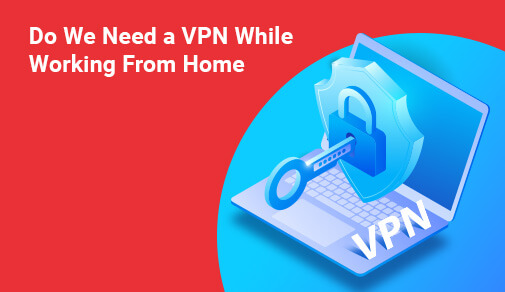Working from home? Here’s why you might need a VPN
-
175
-
14 Sep 2021
-
3 minutes

When it comes to privacy and safety from the numerous prying eyes on the internet, every sensible internet user knows that a Virtual Private Network, or VPN, is your best chance, especially when working or learning from home.
A VPN can frequently be your first line of protection against identity thieves who want to access your sensitive information or advertisers who want to track your online activities.
What is a virtual private network (VPN) and how does it work?
Simply put, a VPN is a connecting method that includes built-in security and safety. VPNs are commonly used by businesses to protect sensitive data from outside parties. As more people work from home and shop online, personal VPNs have grown increasingly popular.
Before you set up your VPN, it's critical to understand the advantages of this tool in order to get the most out of it. Once you activate your VPN, it will do the following, depending on the VPN you choose:
Your IP address is hidden.
Your online traffic will be routed through the VPN's "encrypted tunnel," making it appear as if it originated from the VPN's server. This will mask your genuine IP address and, by extension, your location - IP addresses are unique identifiers.
Stop throttling
During some high-speed activities, such as HD streaming or gaming, your internet service provider may slow down or limit bandwidth. This is known as throttling. Fortunately, your VPN will hide your IP address from online predators and your ISP, allowing you to maintain constant speeds regardless of what you're doing with your internet connection.
Data transfers should be encrypted.
A decent VPN will “encrypt” or padlock your data, allowing only authorised computers on either end of the tunnel to “decrypt” or unlock it.
Bypass restrictions on the internet
You can access websites and applications that are restricted or blocked based on your location. VPNs are especially popular in countries where internet censorship is common because of these advantages.
How to Pick a VPN
##BlogVASBanner##
There are many subscription VPN services available, with prices, terms of service, and even location altering. Before you choose the perfect solution for you, compare and contrast a few key aspects.
Paid pays off:
A free service must make money in some manner, and if you aren't paying, they may be selling your information to the highest bidder instead.
It's important to get feedback:
To avoid native advertising, look for a review of a suitable VPN from a reliable source. In some circumstances, the review you're using as a guide may have been written by the service itself.
Examine the following permissions:
The permission agreement that appears during setup is more than simply a formality. Take a close look at the kind of data the service wants to access.
Encryption is available:
Encryption scrambles your data so that only authorised parties can read it. Use services like NordVPN, which are known for their high levels of security.Obtain a "kill switch": If the encrypted connection breaks, choose a VPN that offers a "kill switch" or auto-shutoff feature. If your VPN leaves you vulnerable to threats, this feature will disable all network communication on your PC.
By ensuring that your VPN meets these basic conditions, you can rest assured that your information is in the hands of a reputable source rather than someone looking to sell it.






